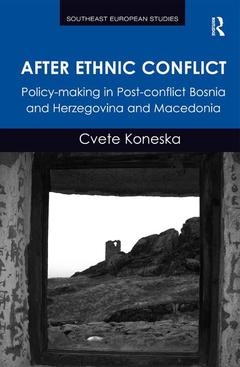After Ethnic Conflict Policy-making in Post-conflict Bosnia and Herzegovina and Macedonia Southeast European Studies Series
Auteur : Koneska Cvete

Date de parution : 12-2014
15.6x23.4 cm
Disponible chez l'éditeur (délai d'approvisionnement : 14 jours).
Prix indicatif 183,14 €
Ajouter au panierThème d’After Ethnic Conflict :
Mots-clés :
accommodation; post-conflict; political; veto; mechanisms; police; reform; domestic; elites; macedonian; NATO Integration; NATO Representative; NATO Official; DRC; OHR; OFA; EU Police Mission; EU Conditionality; Public Administration; Macedonian Political Elites; PfP Membership; Ethnic Accommodation; BiH; DPA; NLA; Post-conflict Bosnia; EU Integration; RS Politician; NATO Membership; Veto Mechanisms; TU; NATO Requirement; Post-conflict Politics; Integrated Education; Minority Education Policy



